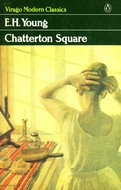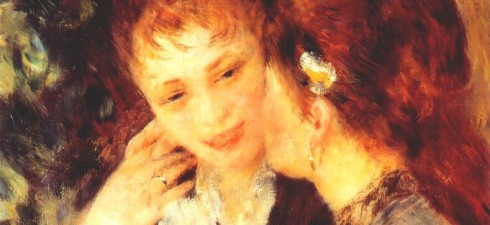 “She’s pretty, but it’s much more than that. What is it?” she asked in innocent inquiry. “I think it must be because she’s so full of life, but not fussily, not noisily. She seems to have some secret way of enjoying every minute. She doesn’t say anything particularly interesting, but she makes you feel that everything is. She’s welcoming, she’s warm,” Mrs. Blackett said.
“She’s pretty, but it’s much more than that. What is it?” she asked in innocent inquiry. “I think it must be because she’s so full of life, but not fussily, not noisily. She seems to have some secret way of enjoying every minute. She doesn’t say anything particularly interesting, but she makes you feel that everything is. She’s welcoming, she’s warm,” Mrs. Blackett said.
I would never have picked Chatterton Square up without Rosie. I doubt I would have taken a closer look at the faded green cover with its stodgy unfamiliar title if I’d come across it at a charity shop or in the library. But Rosie is a member of my book club, a smart and funny storyteller in her own right, and I’ve learned to pay attention whenever she makes a recommendation. I was touched when she brought me a few books that weren’t on the book club reading list, books that had been important to her in the past, which she thought I might enjoy (I think perhaps we’ve formed a special bond as the only members of our club to make it through Anna Karenina and bedside reading stacks of comparable size).
Having never heard of Chatterton Square or E.H. Young I wasn’t sure if I had been given something that deserved to fall by the wayside of history or a forgotten classic. After a slow start, I would say that it is the latter, a novel ripe for rediscovery. Chatterton Square belongs to that Jane Austen class of books, sharply observed drawing room novels written with great wit and character insight. Set in the liminal space between the two great wars of the last century, the story centers on two families — the Blacketts and the Frasers — living in neighboring houses in a middle class but shabby neighborhood in the fictional English town of Upper Radstowe. Herbert Blackett stands at the head of his family, attractive, fastidious and self-satisfied, unaware that his seemingly docile wife Bertha and their three daughters despise him or that his careful meticulous grip on his world is slipping as his family rebels against his control and his country — whose leaders he trusts without question — is avoiding a war it cannot dodge. Set in contrast are the Frasers, headed by the vibrant Rosamund Fraser, a mother of five in her forties. Initially thought to be a widow, (“He pitied widows, but he mistrusted them. They knew too much. As free as unmarried women, they were fully armed; this was an unfair advantage, and when it was combined with beauty, an air of well-being, a gaiety which, in a woman over forty had an unsuitable hint of mischief in it, he felt that … all manhood was insulted … But he knew how to protect himself”) it’s soon revealed that Rosamund is separated from her impulsive, idealistic husband and raising the children on her own with the help of her childhood friend Miss Spanner (a stern, heart of gold old maid-type). Throw in some romance and, you get the idea — any reader of Austen or E.M. Forster can already imagine the flow of the novel, the unconventional warm Frasers shocking and, in some cases, winning over the proper and polite Blacketts. It’s enjoyable stuff, comforting in its now-expected familiarity. But I found myself far more interested in some surprising aspects of the book, which I think make it a forgotten feminist classic.
Most of the writing about the book centers on Young herself. A popular writer in her day, Young lived a secretly unconventional life, which seems to titillate modern scholars and make up most of the information I can find about her or her writing. She was married at a young age to a solicitor who died at the Battle of Ypres in World War I, but while he was still alive she fell in love with Ralph Henderson, a married headmaster who had been his school friend. After her husband’s death (according to the afterword in my edition), she ‘went to live, ostensibly in a separate flat,’ with Mr. and Mrs. Henderson in their home in South London, an arrangement that continued, ‘in this tolerant, outwardly conventional way,’ for more than 20 years. Perhaps because of her popularity in her lifetime, Young was ignored by scholars until the 1980s, when Virago Modern Classics reprinted her novels, but she has recieved little attention in the intervening years.
The quote at the top is about Rosamund. That she is beautiful and unconventional is perhaps to be expected of any female protagonist, but what struck me about her is that she is a happy mother with a full and thriving inner-life. Literature is full of unhappy mothers (bringing to mind Tolstoy’s famous quote about families — “All happy families are alike; each unhappy family is unhappy in its own way.”) — overbearing mothers, mothers who hate being mothers, grieving mothers, mothers obsessed with their children, mothers torn between the love of their children and their lovers/callings to another life. Indeed many of the sources I found on the novel seemed to focus on Bertha Blackett, a mother who loves only two of her daughters and is deeply unhappy in her marriage. While I found Bertha to be a very sympathetic and interesting character, I think the harder trick as a writer is creating a fulfilled mother who is still interesting.
Additionally, in contrast with today’s helicopter parents, Rosamund has a firm belief in a policy of non-interference in her children’s lives, although the home is portrayed as warm and loving throughout the novel. And while Rosamund is passionate about staying out of her children’s business, she is equally passionate about her shame in England’s policy of appeasement before the Second World War. While Young’s political stances in the novel might lack some nuance and the benefit of distance (the novel was published in 1947), there is something delicious about reading page after page of Rosamund and Miss Spanner discussing politics. The two women convene each night in Rosamund’s bedroom to discuss the children, politics, their own histories and families and occasionally, but rarely, the men in their lives. This seems, even now, quietly revolutionary. Their unlikely easy camraderie was, for me, the highlight of the book.
Reading Chatterton Square left me with yearning to discover and reclaim other lost writers and novels. Have you discovered any forgotten treasures?

Sounds like a great read. Thanks for the review.
Thanks for the tip Heidi!
I recently listened to Jane Austen’s Northanger Abbey on Audible.com, thinking I’d come across a forgotten classic. There’s a reason it has been forgotten. It had the elegant, neoclassical style you’d expect, but it has an unfinished feel to it, a plot waivering between satire and romance, ending with a summary with Austen telling, not showing, the ending.
But then I came across, unexpectedly, the John Buchan novel, The 39 Steps, the basis for the Hitchcock movie that I love. It was wonderful. Consider the Jason Bourne series, written with grace and elegance, and placed in Edwardian England … in the countryside. I recommend it and the other Richard Hannay adventures: http://www.amazon.com/Four-Adventures-Richard-Hannay-Thirty-Nine/dp/0879238712/ref=sr_1_10?s=books&ie=UTF8&qid=1320965811&sr=1-10.
I love the film of The 39 Steps, I’ll have to check out the book. And ditto for me on Northanger Abbey.
Thank you for this article. I am wondering where you obtained the photograph, and how you are sure it is EH Young?